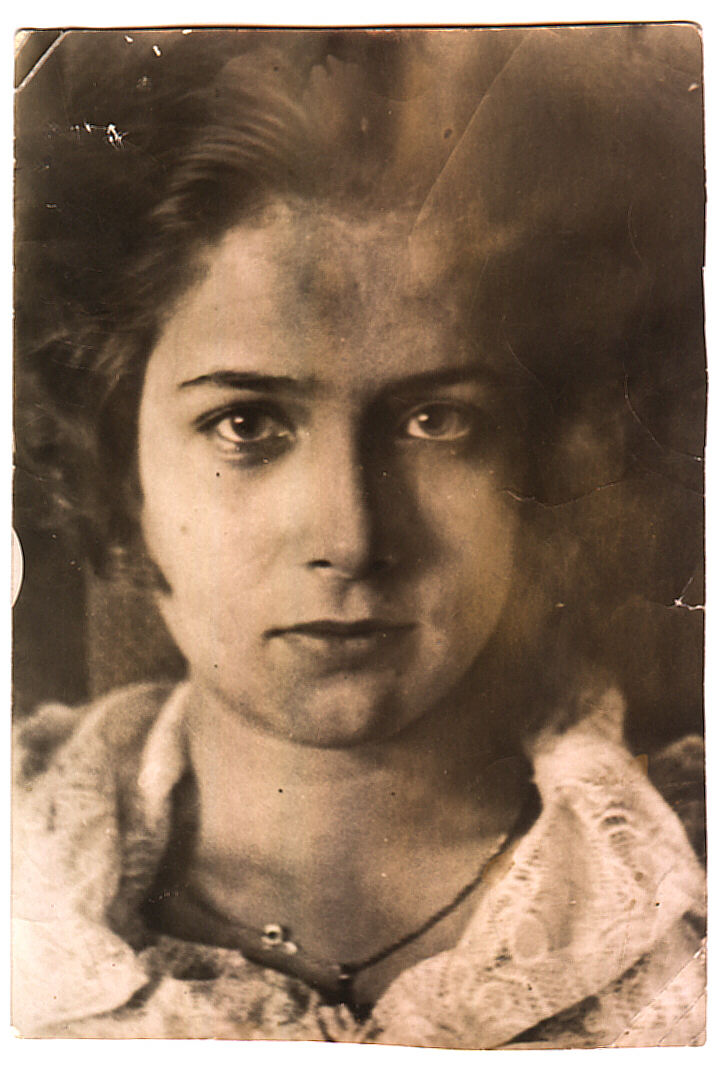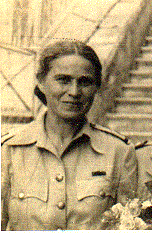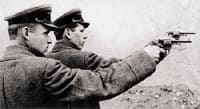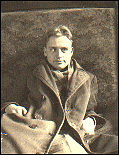Part One – Poland


Janina Sulkowska, 1934

Marzenka, in freedom. Jerusalem, 1943.

NKVD Execution: victims often had to dig their own graves.
A New Cell
Three women in one cell was still quite tolerable. My great fear was being thrown into overcrowded and filthy conditions among strangers and common criminals–twenty or more men were often crammed together under appalling conditions. A political prisoner was at the bottom of the pecking order, but luckily Dubno prison was made up almost entirely of politicals which consisted of both Poles and Ukrainians–and there was some friction between the two groups. But everyone trembled together at the very name of Vinokur who elicited the kind of dread equal to the most notorious Gestapo leaders who would arrive later.
Two wonderful women welcomed me. My first sight of Helena, the widow of a Czarist general, was an older woman with aristocratic features and silver hair under a peasant kerchief–and wearing a tattered evening gown. I would be with “Granny” for over nine months, most of it just the two of us. She was respected as a seer and fortune-teller by prisoners and guards alike. Her life story was like a great novel which I never tired of hearing. As a young woman she had been kidnapped from Poland by a Russian aristocrat who brought her to St. Petersburg, where they married. But the Bolsheviks made her a widow and turned life into a nightmare for her and her four children. In 1932 at the height of the forced famine in Ukraine, Granny fled from Kiev with her children, to start a new life in Poland. But they all fell into the hands of the NKVD following the invasion of Poland, and she and her sons were now in Dubno prison.
Jail Alphabet
My other companion was Elzbieta, or Ela as I called her. Younger than me, she was pretty and intelligent; her crime was being married to a Polish officer (who most likely had been executed at Katyn). She would share our cell for about three months, during which time she taught me the “Pawiak” or jail alphabet which she had learned in Rowno prison. This variation of Morse code, knocked on walls and pipes, was named after the notorious Pawiak prison in Warsaw where countless people were being tortured and executed by the Nazis.
Ela wriggled her five fingers and declared: “That’s all you’ll ever need!”
With practise, we would carry on conversations or hold “literary” evenings, and even pray together. It was our lifeline in prison, and I made sure I taught it to everyone I met. We were on the second floor and communicated by knocking on walls, on the floor and ceiling, and even pipes, so that a network was established throughout the whole prison in which messages were conveyed through intermediaries. Prisoners were thus able to locate friends or relatives and share information from the outside or about prison developments. We even spread word of a strike in which Polish women refused to go out because of a brutish guard, or of a hunger strike on Christmas Eve when the Soviets put a rare piece of meat in our soup to mock our meatless tradition. Such communication was prohibited by our keepers and the punishment was severe.
In time I was able to “talk” to countless women and men and to learn many things. Dzunia who was in the cell next to us, first introduced me to her Polish companions and we communicated extensively. After her trial she was moved across the corridor and we could only send each other messages through a chain of participants. Daily conversations made me feel like I’d known these women for years, even though I would actually meet only a few of them.
Among them was Marzenka Piatkowska who had been imprisoned for her underground activities in Podole. She was one of many who received a sentence under the infamous and all-encompassing Article 58 of the Russian Penal Code: in her case for “historical counter-revolution.” Marzenka was a strong and large woman with a booming voice whom I would only meet face-to-face later. The two of us would miss the executions in Dubno–but we’d share a terrible journey through the Gulag. Her determination would help pull me through hardships, and we’d become life-long friends; she’d emigrate to the USA and I to Canada. The winter of 1940-41 would see numerous women pass through this cell including one from Krzemieniec, from whom I learned of the deportation of my family.
The traffic in my own cell was at a lesser pace. After Ela was taken away, Granny and I were alone for most of the time. We had a few brief visitors like the 17-year-old Ukrainian high school student from Luck, who told us of the raid on her house by the NKVD in search of a fellow-student who was anti-Soviet. She described in detail the shooting at her house and the capture of her friend, and the horrible fate of her grandfather whose body was found the next day–his tongue and eyes cut out.
A Polish milkmaid spent her short stay wringing her hands over a “crime” which eluded understanding. We didn’t know whether to laugh or cry. The poor woman had gone to town to sell some eggs for which she received a few rubles. But whatever stores remained open were now under Soviet rules of mismanagement–the shelves were empty. The only item that was plentiful were portraits of Stalin. And so she bought a picture of Joseph Stalin, noble and smiling enigmatically. And off she went with his portrait tucked under her arm…until she ran into a Soviet soldier who wanted to know what she was carrying. She showed him, and proclaimed that she had “grabbed Stalin by the eggs!” The soldier burst out laughing at the double-entendre–and promptly arrested her. She was thrown into jail for mocking the “Genius of Mankind.”
Another “lost soul” was a recent newlywed whose mind had become unhinged with her arrest and separation from her husband–whom she was confident would clear up the mess and arrive at any moment to take her home to their love-nest, Thus she sat against the wall all dressed up in her flowery hat and little purse on her knees. With every visit by the guards she’d jump up insisting that she was all ready to go–only to be pushed back every time. We could only admire her delusional determination, but it was also very pathetic.
Death Row
One autumn morning I was awakened by someone trying to communicate with us. The knocking emanated from the ceiling where we’d never received messages before; I answered with the proper code.
“I am one sentenced to death.” came the chilling response.
My initial reaction was that it was a joke, perhaps a Soviet trap, but I risked it and identified myself as “Janka from Krzemieniec.” A slow tapping answered: J-u-r-e-k B-r-o-n-i-k-o-w-s-k-i. It was the same Jurek (alias Potapow) whom I had sent to the Trautmans where he was captured by Titov! But the grate of keys in the door forced me to pound on the wall in the emergency way of ending a conversation. The guards had arrived to take us out to the uborne [washroom].
All day I was unable to re-establish contact and could only imagine that poor Jurek was being dragged out to a field where he’d be forced to dig his own grave before being executed. That night I tossed and turned going over my part in the chain of events surrounding his predicament. But the next day a tapping from upstairs announced that Jurek was still alive!
From him I learned about the arrests and military trials of members of our group; of how Colonel Majewski had been arrested in Rowno, betrayed by the sound of his typewriter at night. We had no idea of how the NKVD was able to pick off our members so easily and who among us, if anybody, had betrayed the cause. Jurek assured me that he did not hold me in the least responsible for his fate, and had no regrets, except that he couldn’t fight the Soviets.
Dreams
Granny was referred to as babushka, manaszka, or simply “nun” by even the guards who treated her with respect for her gift of second-sight and dream analysis. Dream interpretation became a major preoccupation for the two of us. At first we analyzed each others dream worlds, but later as I became adept at the Pawiak, other prisoners would send their dreams through me for Granny to analyse. Her interpretation of a particularly vivid dream of mine stayed with me for my whole life, and as the war and my suffering progressed, so did the meaning of the dream as revealed by Granny.

Bronek Rumel
Jurek put me in contact with Bronek Rumel in a neighbouring cell, who also was sentenced to death. The entire third floor above us was reserved for men slated for execution. We tried to assure them that the Soviets would commute their sentence to hard labour in a camp; Bronek was of a similar mind–but Jurek insisted that there was no reprieve from a military court.
Some on “death row” had their dreams interpreted by Granny and myself. They suffered terrible nightmares: chasms filled with snakes, forest fires, shots in the dark. Jurek had a recurring images of an Easter parade with holy icons–but which he could not take part in. We would try to put a positive spin on their dark dreams, but Granny always said: “Bad dreams never predict anything good.”
The floor below us also contained male prisoners, among them friends of Marzenka, and also Pawel Zaleski, the elder brother of Pius. He was being held because of his brother’s activities, in spite of the fact that his family had convinced us not to make him part of our organization in order to keep one son safe. In time he would be released by the Soviets and would survive the war.
Christopher Jacek Gladun was born in 1951 and grew up in Canada to where his family emigrated from England as displaced persons. Sadly, Chris died in Toronto in March 2003. He held a diploma in Journalism from the Niagara College and a BA in Polish Language & Literature from the University of Toronto. Chris also acted as interviewer and researcher for the documentary film “Rescued From Death in Siberia”.
This content is now maintained by the Kresy-Siberia Group, which Chris was a charter member of and which is taking his website and his research work forward.